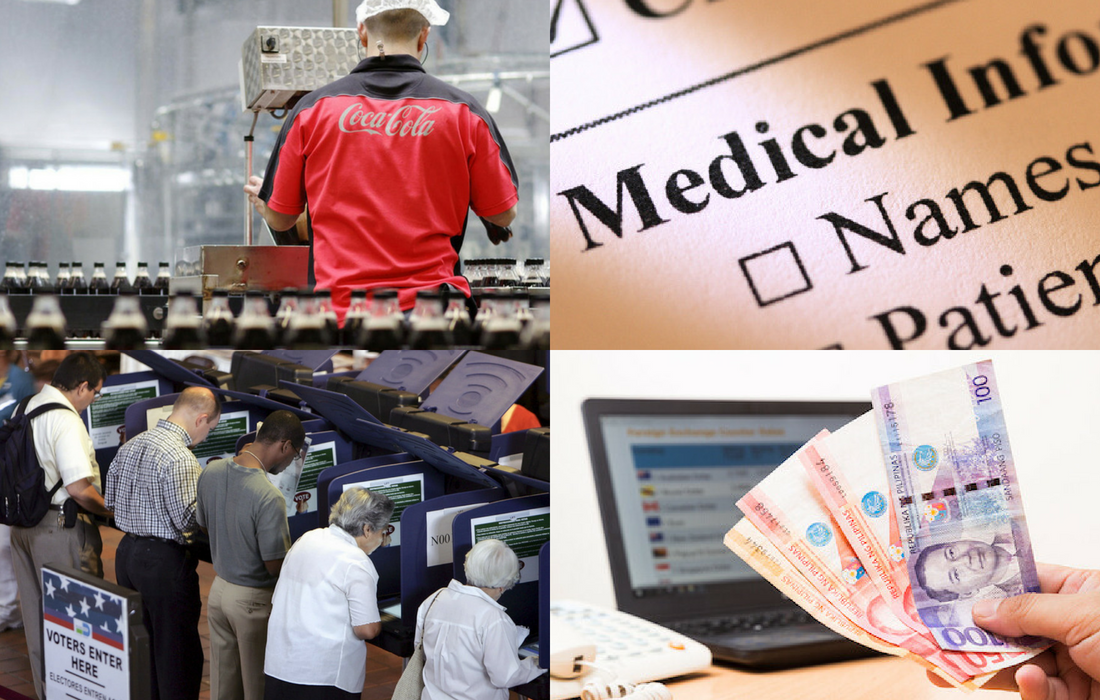2018 brings another year full of new blockchain projects to the market.
Since Bitcoin’s launch in 2009, there has been a constant stream of interesting ideas using blockchain as its foundation. And with any growing industry, it’s difficult to keep track of every single project that is being designed and developed as many would focus on a promising few.
Namely, cryptocurrency.
However, the three keys to blockchain are often overlooked—decentralisation, simplicity, and speed. While blockchain may have gained its fame in the financial realm, this technology is easily adaptable when used as the core application in a wide array of arenas.
Recognising that the technology’s potential is limited only by the imagination of developers, here are 6 blockchain projects, happening worldwide, that show the different ways it can be used.
1) Collaboration between Coca-Cola & the U.S. State Department.

According to the International Labor Organization, nearly 25 million people work in forced-labor conditions worldwide with the food and beverage industry being among the largest users of forced labor.
Thus Coca-Cola, the U.S. State Department and a handful of their partners have teamed up to develop an exciting project to combat this.
The goal is to create a registry for sugar supply-chain workers in foreign countries to ensure that employers are honoring their scope of work contracts.
By 2020, Coca-Cola will provide data on child labor, forced labor, and land rights from 28 country-level studies; the State Department will bring its labor expertise to the table; and the other partners (Emercoin and Bitfury Group) will build the blockchain-based registry.
The project will be done via a smart contract (a series of protocols designed to verify, facilitate, or enforce the negotiation of a contract).
Rather than workers agreeing to work terms through paper or word-of-mouth promises that could be altered, these contracts would be stored on a transparent and secure blockchain registry.
Though a blockchain registry can’t force employers to honor their contracts with workers, it would create a system that could ultimately compel employers to be fairer with their workers.
2) Collaboration between Gem & the Centre for Disease Control.

Data has become an integral piece for modern medicine to better heal the sick. The biggest drawback? Fragmentation.
Hospitals, general practitioners and specialist clinics all use different electronic records systems, making it hard to look into a patient’s health history or treatment record.
Blockchain has emerged as a possible solution by using the Ethereum network to pull patients data from different local storage systems. This lets other medical practitioners see the records if given permission by the patient.
Another way blockchain is used for healthcare is a project started by Gem (a software company) and the Centre for Disease Control (CDC).
CDC researchers are looking at ways to manage population health and disaster response by putting data collection and analysis operations on the blockchain.
A problem they want to address is degradation of data after it’s collected so by putting the data in an immutable, blockchain-based ledger, it could go a long way toward ensuring data transparency and accuracy.
3) The West Virginia elections.

In May 2018, West Virginia was the first U.S. state to allow internet voting by blockchain in primary elections.
The blockchain-based mobile voting platform, developed by Voatz, was only available to a select group of voters to test the technology in a pilot project.
A voter’s identity was first verified using biometric tools like a thumbprint scan before voting on a mobile device. Each vote forms part of a chain of votes, where it is then mathematically proven by the third party participant.
Using blockchain, all data of the election process can be recorded on a publicly verifiable ledger while maintaining the anonymity of voters, with results available instantly.
4) Steemit’s Video Content Platform.

Emerging as a competitor to YouTube, Dtube is an application built on top of the Steemit peer-to-peer network.
For context, Steemit is a social media website that is based on the cryptocurrency STEEM which can be exchanged for Bitcoin, and that in turn can be exchanged for money.
On Steemit’s blogging website, content creators are paid according to the number of reactions they get from content consumers in terms of likes and comments.
Dtube users who upload videos will be paid using a similar model; according to the number of views, likes and comments they accumulate.
Anybody can upload videos and earn votes if people like your content.
So why would content creators and consumers want to use Steemit and Dtube over its centralized competitors like ‘Youtube’ and ‘Medium’?
Well, as Steemit and Dtube are decentralized, this means that no one person or company controls what users can write, upload or distribute.
This means that the platforms are completely censorship-resistant, a feature that many users enjoy as it gives users complete creative freedom. For content that is considered illegal or inappropriate, the community can vote content off the platform.
Another feature that attracts users is the fact that user data on both platforms remain in the ownership of the content creator. This is different from Youtube and Facebook for example, who control the data and have the power to sell your user statistics to other companies.
DTube’s open nature and easy way to earn money is perhaps their advantage against other video platforms now.
5) Partnership between Air New Zealand and Winding Tree.

The travel industry relies a lot on information being passed on between parties.
The decentralized nature of the blockchain means that information can never go ‘offline’ or be lost through accidental deletion or a malicious cyber attack, ensuring transactions are always traceable.
Air New Zealand has partnered with Swiss-company Winding Tree for their baggage tracking and booking services using blockchain.
The lack of third-party involvement means that booking and tracking can be achieved easily, safely and securely, and Air New Zealand customers can benefit from reduced transactional costs.
6) The i2i project in the Philippines.

In 2017, the Finance Secretary of Philippines, Carlos G Dominguez III, said “over 86% of Filipinos remain unbanked to this day”.
To spread financial inclusion to a largely unbanked population, the Union Bank of the Philippines (UnionBank) is using blockchain.
The payment system developed by US-based startup ConsenSys in collaboration with UnionBank will be linking rural banks to the national financial network.
The blockchain pilot will help reduce the costs of connecting rural banks with BancNet or SWIFT services, otherwise requiring them to spend hefty sums on data centers and cyber security infrastructure.
Using i2i, Filipinos don’t have to spend anything. They just have to load the application in their computers, tablets, or smartphones and they can transact bank-to-bank connected to blockchain.
-//-
These projects are merely scratching the surface of how blockchain is being used around the world. There are still a large number of projects in development or currently on the market that really shows the advantages of this technology.
If you are curious to know more about these different applications, there is an event that could help open your eyes further to blockchain’s potential.
KL Blockchain Week is a 4-day event in September where entrepreneurs, developers and regulators will be sharing their crucial insights and discuss further about the future of blockchain.
A highlight you can look out for is Blocfest, Southeast Asia’s International Blockchain Event.
There will be over 30 international blockchain thought-leaders including respected blockchain entrepreneurs, developers and regulatory and academic experts.
Tickets are up for sale now but specially for our readers, Blockchain Asia is giving an exclusive discount for the entry tickets so you won’t miss out on the chance to attend this international event!
You can now purchase the VIP ticket (originally priced at USD$450) and/or the normal ticket (originally priced at USD$375) with a 20% discount by keying in the promo code KLBCW-8 during checkout.
- For more information on Blocfest, and to check out the agenda for yourself, you can find their official website here.
- If you’re interested in providing partnerships or sponsorships for Blocfest, you can reach out to the team at sponsorship@blocfest.asia.
- For more information on KL Blockchain Week 2018, you can click here.
This article is written in collaboration with Blockchain Asia.
Feature Image Credit: Compiled from cokecanada.com, compareremit.com, legacyhealth.org, and cnn.com.









